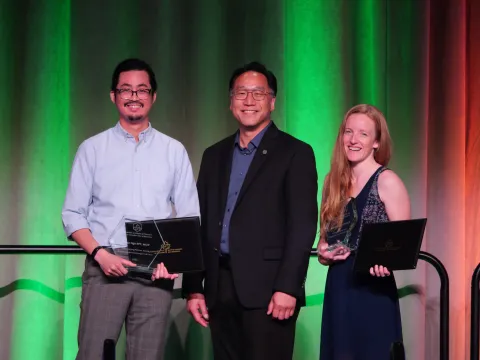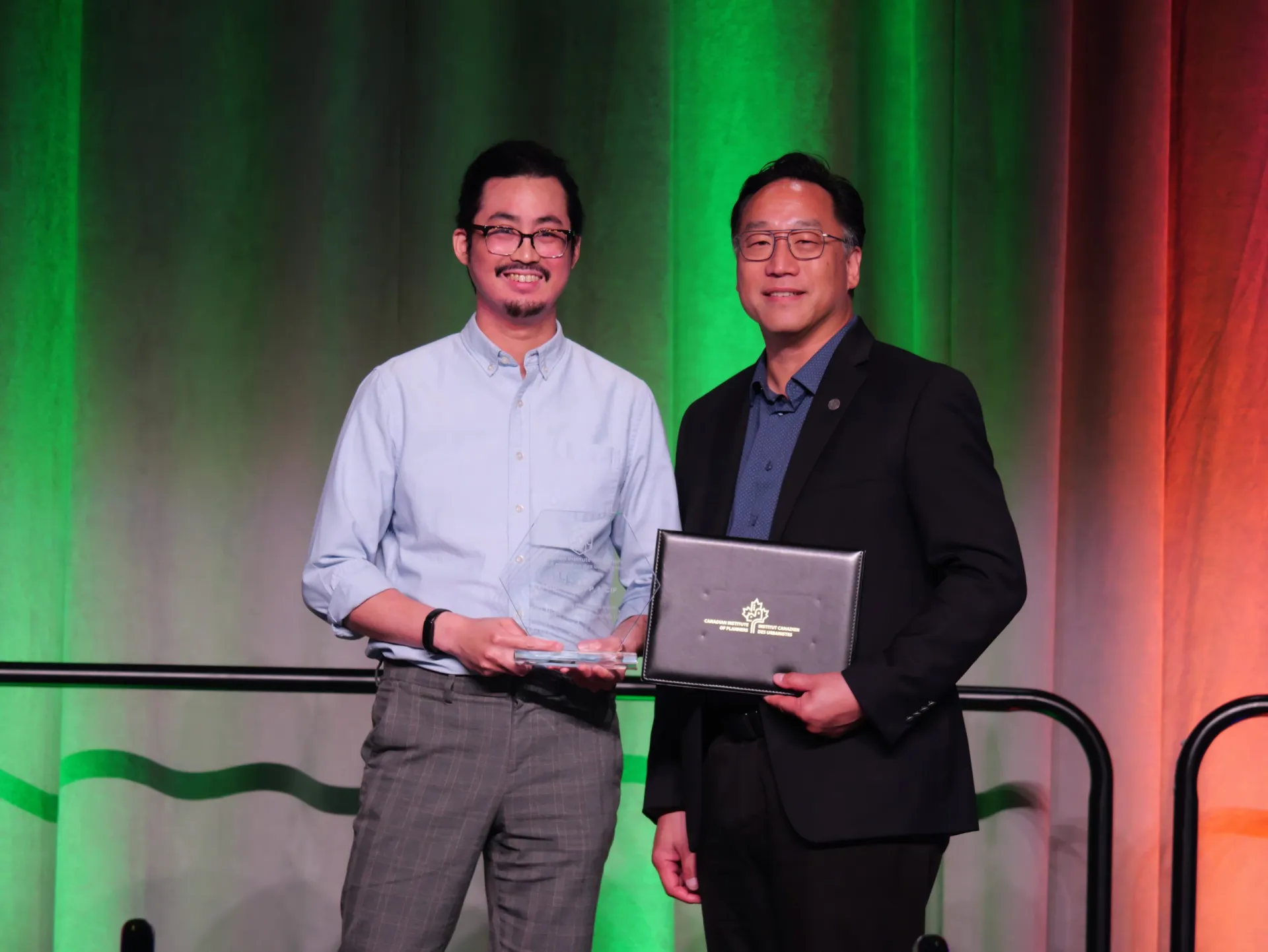
We're delighted to celebrate SCARP alumni Melanie Harding (2014) and Victor Ngo (2016), who received the 2024 Emerging Planner Award from the Canadian Institute of Planners during CIP's 2024 Conference in Edmonton, Alberta!
Since graduating, both of these alumni have undertaken extraordinary work, which surely grabbed the attention of CIP.
About CIP and this award
The Canadian Institute of Planners is a member-based organization which advocates for planners nationally and internationally, and provides a number of membership services. Being a student in SCARP, an accredited planning program, makes you more eligible to join in on many of these services!
The CIP Emerging Planner Award (previously known as the President’s Award: Young Planner) celebrates the leaders of tomorrow. It recognizes the outstanding professional success and achievement – including leadership and/or service to the profession – of a Canadian planner within their first ten years of professional planning experience.
Recipient: Melanie Harding RPP, MCIP
Melanie Harding is a planner with the Ɂehdzo Got’ı̨nę Gots’ę́ Nákedı (Sahtú Renewable Resources Board) in the Northwest Territories, where she leads work relating to Hıd̨ó Gogha Sęnę gots’ıɂ̨á (Planning for the Future) which focuses on community-led plans for conservation of wildlife and their landscapes in the Sahtú Settlement Area. She is a strong advocate working to build creditability and acceptance of Indigenous ways of planning and conservation in the face of deeply entrenched colonial approaches to planning and conservation in the Northwest Territories and in Canada. She works closely with Elders, language speakers, knowledge holders, and land users in articulating Indigenous ways of planning and embedding them in community and conservations plans.

Melanie is an Instructor in the University of Alberta’s Planning School for an undergraduate/graduate course on Community Planning with Indigenous Communities. In her classes, she coordinates Indigenous planners as guest speakers to share their perspectives, experiences, and wisdom with students and guides students in understanding the colonial legacy of the planning profession, current implications in planning work, and how to use this knowledge in their careers. She also returns most years to the Indigenous Community Planning program at SCARP/UBC, where she graduated in 2014, to share her learning with new cohorts of the ICP program.
She is a former member of CIP’s Indigenous Community Planning Committee, where she contributed to the development of CIP’s Policy for Planning and Reconciliation. She has been a member of the National Indigenous Advisory Committee for Indigenous and Northern Affairs Canada, which is guiding the development and Implementation of INAC’s National Community Development Strategy.
Melanie was the Project Manager and Lead of the Nishnawbe Aski Development Fund’s Comprehensive Community Planning Toolkit: Finding Bimadizowin, which won the CIP Award for Planning Excellence in Planning Publications in 2018. The toolkit was intended for northern Ontario Indigenous communities, but has been referenced by the BC Aboriginal Child Care Society, the University of Saskatchewan, the Red Circle Planning Group, the IPCA Knowledge Basket, numerous Indigenous planning projects, and publications from Toronto Metropolitan University. For many local community planners, this toolkit has been the introductory textbook on planning, often along with trainings organized by Melanie.
Melanie also contributes to the profession as a network builder. Through her efforts to support communities, she has brought together a wide range of planning professionals either as consultants or as speakers and trainers at the various conferences and gatherings she has organized. This network of Melanie’s has evolved into an informal think tank of planners working in Indigenous spaces, constantly sharing resources and checking in with each other about best practices and ethics.
Recipient: Victor Ngo RPP, MCIP
Victor Ngo is a Senior Transportation Planner with WATT Consulting Group, where he works on multi-modal transportation planning and engineering projects in urban, rural, and Indigenous communities throughout Western Canada and co-leads WATT’s Vancouver office to oversee projects in the BC South Coast region. He is a Rick Hansen Foundation Accessibility Certification Professional, where he incorporates universal design principles to create more accessible and barrier-free communities. Victor’s practice spans the provincial to site scale, where he works with local governments, public sector organizations, and non-profit & private landowners on a variety of pressing policy, strategy, and design challenges. Victor holds a MA in Planning and BA in Geography from the University of British Columbia (UBC).

In addition to his active consulting work, Victor has been involved in applied research at the intersection of urban planning and public health as a Research Associate at the Health & Community Design Lab in the UBC School of Population and Public Health. Victor’s work has been published and cited in a range of academic journals on various topics from urban greenways to capacity-building and community engagement for climate change action.
Victor has been active as a volunteer supporting the planning profession in a number of roles. He regularly serves on the Professional Standards Board’s Accreditation Site Visit Teams and has represented CIP on various national initiatives, including with the Public Health Agency of Canada, Natural Resources Canada, and the Transportation Association of Canada. Victor has made presentations, moderated discussions, and led workshops at both CIP and PIBC conferences. He also regularly mentors students at the UBC School of Community and Regional Planning.
In the community, Victor volunteers with youth and sustainability-related non-profit boards and committees, including as a board director with The Starfish Canada, a member of the Youth Program Advisory Committee at the Fraser Basin Council, and a member of the Youth Vital Signs Leadership Council at the Vancouver Foundation. He was also a member of the Development Permit Board for UBC Campus and Community Planning.
Congratulations!
- Spotlight